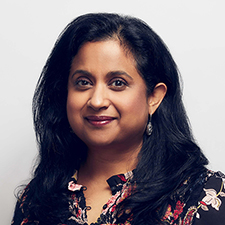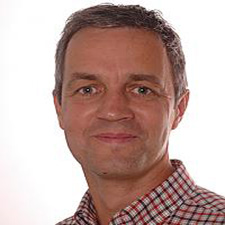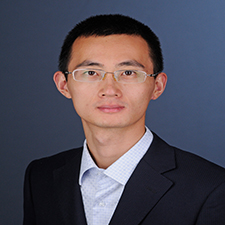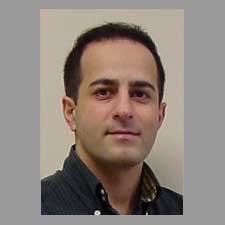Proceedings of the 9th International Conference
on Control, Dynamic Systems, and Robotics (CDSR'22)
June 02 - 04, 2022 | Niagara Falls, Canada
Virtual Conference
The Plenary and keynote information for the 9th International Conference of Control, Dynamic Systems, and Robotics (CDSR'22) is as follows:
Plenary Speakers

Dr. John Doyle
California Institute of Technology, USA

Dr. Deepa Kundur
University of Toronto, Canada

Dr. Xinzhi Liu
University of Waterloo, Canada

Dr. Rodolphe Sepulchre
University of Cambridge, UK

Dr. Simon Yang
University of Guelph, Canada
Keynote Speakers

Dr. Huazhen Fang
University of Kansas, USA

Dr. Behrad Khamesee
University of Waterloo, Canada
CDSR'22 Plenary Speakers

Dr. John Doyle
California Institute of Technology, USA
John Doyle is the Jean-Lou Chameau Professor of Control and Dynamical Systems, Electrical Engineer, and BioEngineering at Caltech, and received the BS&MS in EE, MIT (1977), and PhD in Math, UC Berkeley (1984)). He was a consultant at Honeywell Systems and Research Center from 1976 to 1990.
Research is on mathematical foundations for complex networks with applications in biology, technology, medicine, ecology, neuroscience, and multiscale physics that integrates theory from control, computation, communication, optimization, statistics (e.g. Machine Learning). An emphasis on universal laws and architectures, robustness/efficiency and speed/accuracy tradeoffs, adaptability, and evolvability and large scale systems with sparse, saturating, delayed, quantized, uncertain sensing, communications, computing, and actuation. Early work was on robustness of feedback control systems with applications to aerospace and process control. His students and research group developed software packages like the Matlab Robust Control Toolbox and the Systems Biology Markup Language (SBML).
Topic of Keynote: Universal Laws and Architectures and Their Fragilities

Dr. Deepa Kundur
University of Toronto, Canada
Deepa Kundur is Professor & Chair of The Edward S. Rogers Sr. Department of Electrical & Computer Engineering at the University of Toronto. A native of Toronto, Canada, she received the B.A.Sc., M.A.Sc., and Ph.D. degrees all in Electrical and Computer Engineering in 1993, 1995, and 1999, respectively, from the University of Toronto. Professor Kundur’s research interests lie at the interface of cybersecurity, signal processing and complex dynamical networks. She is an author of over 200 journal and conference papers and is also a recognized authority on cyber security issues. She has served in numerous conference executive organization roles, and has participated on several editorial boards and federal government funding panels. She currently serves on the Advisory Board of IEEE Spectrum. Professor Kundur’s research has received best paper recognitions at numerous venues including the 2015 IEEE Smart Grid Communications Conference, the 2015 IEEE Electrical Power and Energy Conference, the 2012 IEEE Canadian Conference on Electrical & Computer Engineering, the 2011 Cyber Security and Information Intelligence Research Workshop and the 2008 IEEE INFOCOM Workshop on Mission Critical Networks. She is a Fellow of the IEEE, a Fellow of the Canadian Academy of Engineering, and a Senior Fellow of Massey College.
Topic of Keynote:Analytics-Driven Cyber-Physical Security for a Converged Smart Grid

Dr. Xinzhi Liu
University of Waterloo, Canada
Xinzhi Liu received the B.S. degree in mathematics from Shandong Normal University in 1982 and the Ph.D. degree in applied mathematics from University of Texas at Arlington in 1988. He was a Post-Doctoral Fellow at University of Alberta from 1988 to 1990. Then he joined the Department of Applied Mathematics, University of Waterloo as an Assistant Professor, where he became an Associate Professor in 1994 and a Full Professor in 1997. He has authored or co-authored more than 400 journal articles, six research monographs, and 20 edited books. His current research interests include hybrid dynamical systems, multi-agent systems, complex dynamical networks, and infectious disease modeling.
Topic of Keynote: Hybrid Formation Control of Multi-Agent Systems

Dr. Rodolphe Sepulchre
University of Cambridge, UK
Rodolphe Sepulchre received the engineering degree (1990) and the PhD degree (1994), both from the Université catholique de Louvain, Belgium. He was a postdoctoral research associate at the University of California, Santa Barbara, from 1994 to 1996. He was then appointed at the Université de Liège in 1997. In 2013, he moved to Cambridge, UK, where he holds the control chair in the Department of Engineering and a professioral fellowship in Sidney Sussex College. He held visiting positions at Princeton University (2002-2003), the Ecole des Mines de Paris (2009-2010), California Institute of Technology (2018), and part-time positions at the University of Louvain (2000-2011) and at INRIA Lille Europe (2012-2013). He was the Petar Kokotovic Distinguished Visiting Professor of UCSB in 2019.
He is a fellow of IFAC (2020), IEEE (2009), and SIAM (2015). In 2008, he received the IEEE Control Systems Society Antonio Ruberti Young Researcher Prize. He was elected at the Royal Academy of Belgium in 2013. He is the recipient of the 2020 IEEE Axelby Best Paper Award. He is (co-) author of the monographs Constructive Nonlinear Control (1997, with M. Jankovic and P. Kokotovic) and Optimization on Matrix Manifolds (2008, with P.-A. Absil and R. Mahony). His current research interests include the differential theory of nonlinear systems and the feedback control principles of neuronal circuits. His research is currently funded by the ERC advanced grant Switchlets (2015-2021). He is Editor-in-Chief of the IEEE Control Systems Magazine since 2020.
Topic of Keynote: Spiking Control Systems

Dr. Simon Yang
University of Saskatchewan, Canada
Prof. Simon X. Yang received the B.Sc. degree in engineering physics from Beijing University, China in 1987, the first of two M.Sc. degrees in biophysics from Chinese Academy of Sciences, Beijing, China in 1990, the second M.Sc. degree in electrical engineering from the University of Houston, USA in 1996, and the Ph.D. degree in electrical and computer engineering from the University of Alberta, Edmonton, Canada in 1999. Prof. Yang joined the School of Engineering at the University of Guelph, Canada in 1999. Currently he is a Professor and the Head of the Advanced Robotics and Intelligent Systems (ARIS) Laboratory at the University of Guelph in Canada.
Prof. Yang has diversified research expertise. His research interests include robotics, artificial intelligence, sensors and multi-sensor fusion, wireless sensor networks, intelligent control, machine learning, fuzzy systems, intelligent communication and transportation, and computational neuroscience. Prof. Yang he has been very active in various professional activities. He serves as the Editor-in-Chief of International Journal of Robotics and Automation, and an Associate Editor of IEEE Transactions on Cybernetics, IEEE Transactions of Artificial Intelligence, and several other journals. He has involved in the organization of many international conferences.
Topic of Keynote: Neuro-dynamics based Intelligent Control of Various Autonomous Robotic Systems

Dr. Huazhen Fang
University of Kansas, USA
Huazhen Fang is an Associate Professor of Mechanical Engineering at the University of Kansas, where he joined in 2014 and has led the Information & Smart Systems Laboratory. He received his Ph.D., M.Sc., and B.Eng. from the University of California, San Diego (Mechanical Engineering, 2014), University of Saskatchewan, Canada (Mechanical Engineering, 2009), and Northwestern Polytechnic University, China (Computer Science, 2006), respectively. His research interests lie in modeling, control and estimation theory with application to energy management and cooperative robotics. He has received the 2019 National Science Foundation Faculty Early Career Award. He currently serve as an Associate Editor for Information Sciences, IEEE Transactions on Industrial Electronics, IEEE Open Journal of Control Systems, IEEE Open Journal of the Industrial Electronics Society, and on the IEEE Control Systems Society Conference Editorial Board.
Topic of Keynote: Unleash the Combined Power of Physics and Machine Learning for Advanced Battery Management

Dr. Behrad Khamesee
University of Waterloo, Canada
Dr. Behrad Khamesee is a Professor in the Department of Mechanical and Mechatronics Engineering, University of Waterloo, Canada. He is the director of MagLev Microrobotics Laboratory and co-PI of the RoboHub state-of-the-art robotics facility at the University of Waterloo. His research interests and expertise include design, modeling, and control of advanced mechatronics systems, particularly microrobotic magnetic levitation and semi-active electromagnetic dampers for vehicles.
His research has resulted in 90 refereed Journal and conference papers, and his research group is a recipient of several best paper awards. His research group developed the world’s smallest magnetically-levitated microrobot which is equipped with a gripper. Dr. Khamesee is involved in conferences program committees, has organized several sessions at international conferences, and is a technical reviewer for several IEEE Journals.
Topic of Keynote: Magnetic Levitation for Microrobotics and Micromanipulation